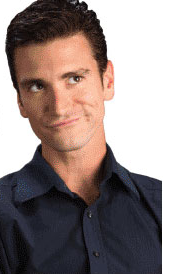This is a guest post by Clayton Fletcher. Clayton is a professional stand up comedian who plays all over the country, has been on HBO, is a regular at Caroline’s on Broadway and has his own weekly show at New York Comedy Club. You can learn more about Clayton on his website here.

1. Get onstage as much as humanly possible
In my view, becoming a really good comic requires hours and hours of stagetime. When I started, I did every open mic in town and at least one bringer show every week. I would also ask to perform at family parties, office functions, basically anywhere and everywhere I could. There is just no substitute for stagetime.
2. You will always be a bringer
What I mean is suppose that someday you become famous and you are asked to be the headliner at the Laughy Ha-Ha Club in Plano, Texas. They will invest fortunes in advertising your arrival, marketing your performances, and staffing their club so that you can have a great show. If nobody comes to see you, do you think you will be asked back? Always promote every show you are in. Especially in New York where there are ten million comics, one great way to get a leg up on the competition is to help the club out by letting your fans know you are coming! Since comedy clubs are businesses, they will appreciate the fact that you help increase their patronage!
To put it another way, if you were in a great band that had absolutely no following, how many gigs do you think you would be able to get twice? Why should comedians be any different?
3. In the beginning, stick to one club.
The other side of the coin is that if you are popular enough to have friends who want to come see your show, you should focus your efforts on one club. Many comedy club owners (Al Martin among them) pride themselves on developing young talent into tomorrow’s superstars. I can’t tell you how many times I have heard a club owner say “I gave him his start and now he’s headlining for me!” or “Why should I book her? When she started out she did bringer shows and open mics every week at ______ Comedy Club! Now she wants to work for me?” You simply can not build a solid relationship with a club by spreading shows out in all the clubs around town.
Become associated with one venue and the rest will follow. If you are talented and you put the work in and show loyalty to a club and a producer, we remember this and look for ways to help you down the line. And then when you try to get work at Club B and C you can say “Well I do regular feature spots at NYCC and now I am trying to branch out.” It lends credibility much more than “I am doing bringers all over town” ever can.
4. There is more than one way to get there.
Many comics ask me what they should do if they do not have friends. Frankly, I am skeptical of anyone who claims not to know a single person who wants to see them perform, but if you are in this group, you still have hope! Get your stagetime in “non-traditional” venues. When I started out I did shows in sushi restaurants, pizza parlors, every bar in New York that had a back room, and quite a few that didn’t. Most of these shows were disastrous but believe me if you can kill at McMickerson’s Pub while the foreigners watch a soccer game, you will tear the roof off the Broadway. Again it all comes down to stagetime and finding ways to get it.
5. Write write write.
Comedians are writers. When you finally get up onstage, you should not be at a loss for words. Rework the old stuff, try to come up with new stuff. Never stop writing!
6. Produce your own show!
One of the best ways to get onstage early in your career is to put your own show together. You can learn to MC, you can begin to network with your peers, you might even create the next “hot new comedy room” in New York. Best of all, you will have the flexibility to do what you want for as long as you want onstage. But even then, if nobody comes to see you I doubt your neighborhood bar will keep Jeffy’s Comedy Night going for long. As I said, we are all bringers and always will be.
7. Be polite.
There are so many comics who seem to have never been taught manners. How many times haveI been dealing with a paying customer only to have a comic interrupt me: “What’s the lineup?” And howfew times have I actually been thanked for helping a new comic get an opportunity? Politeness is in shortsupply these days, so even a simple gesture of mutual humanity can go a long way.
In closing, I want you all to know that I am here for you and I am rooting for you. So build your act, find your persona, build your fan base, and we can all conquer New York City together someday soon!
Other Comedy Tips:
[wp_list_bookmarks category=”2″ & categorize=”0″ & title_before=” ” & category_before=” ” & category_after=” ” & title_li=”0″]


